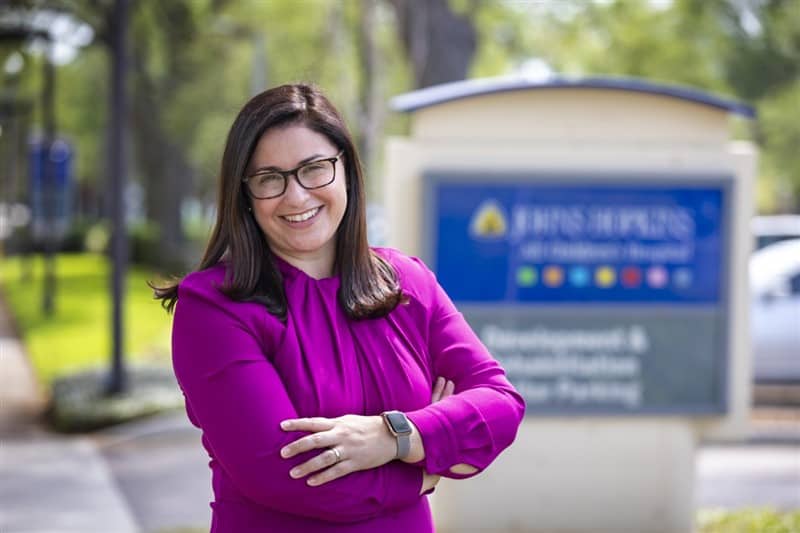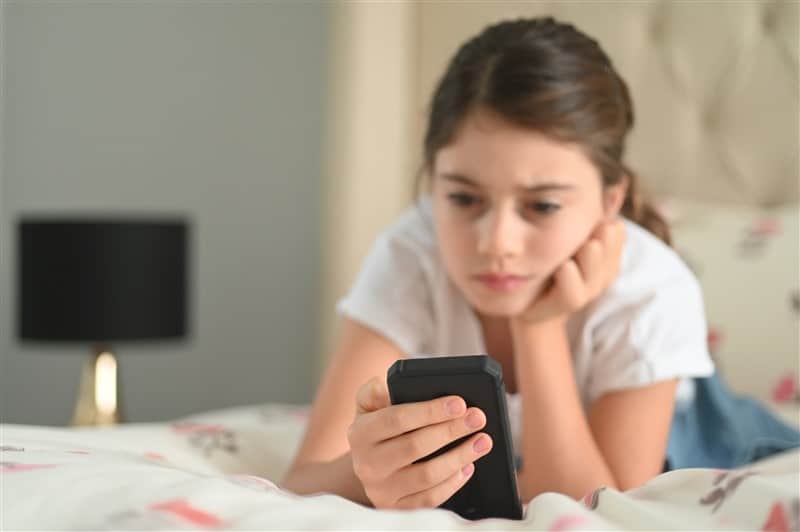Is your child addicted to social media? Here’s what you need to know.
Life is all about balance, right? It’s something we strive for in most parts of our lives, and it’s no different when it comes to social media. Unfortunately, social media’s impact hasn’t always been so good on our kids (or us adults). But it’s not all bad news and no, we don’t have to stop the scroll.
Jennifer Katzenstein, Ph.D., director of psychology and neuropsychology and co-director of the Center for Behavioral Health at Johns Hopkins All Children’s Hospital, says we CAN find a healthy balance. We recently spoke with her to learn more about what we can do as parents to teach our kids how to be healthy consumers of social media—and maybe learn a few lessons ourselves along the way.

Looking for Things to Do in Tampa Bay?
>>This Week’s Favorite Events
>> Nearby U Pick Farms
>> 40+ Free Things to Do with Kids
How do the workings of a child’s brain impact how they consume social media?
Dr. Katzenstein: One of the things to keep in mind is that the frontal lobe, the front-most part of the brain, isn’t fully developed until the early to mid-20s. That part of our brain is responsible for planning and organization, multi-tasking, putting the brakes on, and knowing when enough is enough. So, it’s really interesting to think about our kids’ brains not being fully developed yet. It’s harder for them to know when to stop, and they are going to be more impulsive in the decisions that they make. So that’s really where it comes in for us as parents and caregivers to help support, teach , and put restrictions surrounding that.

Is there an age that’s appropriate for a child to be on social media?
Dr. Katzenstein: This is a huge debate right now. There’s been a lot of data surrounding those early teenage years (13 to 15) to be the first time. Other groups are pushing for 18 years old. For me, there are a couple of different pieces.
One: is your child responsible? Do you feel like you can trust your child in that social media setting or platform when you can’t be there all of the time? And then, what is the agreement? At 13, can sit down with your child and say this is the contract we are going to have in terms of electronic and social media use? If they are in a good place, they are dependable, and you can trust them—then that may be a great age to start, but potentially later could be better too, especially if you have a child who may already be impulsive or may not be following rules in other areas. This is really a privilege.
Also, every app your child is on, you should know how it works and you should be on there too. Certainly, for any social media we are choosing for our kids, if you’re not on it and you’re not following them then they shouldn’t be on it.
It’s a hard enough concept for some adults to grasp, but social media doesn’t always portray everyday life or real moments. Everything seems photoshopped these days and posed. This has to be hard for kids to understand as they scroll their feeds.
Dr. Katzenstein: It is super interesting. The data actually suggests that for kids who follow people they don’t know in real life, there is a greater mental health impact in terms of greater rates of depression and anxiety. It’s really important for kids to only be following people they know because we put our best pictures, our best filters on our social media posts. If you know that person in real life, then you know every moment in their life isn’t like that. But when we’re following people and all we see is the perfect moments, we’re thinking other people are living these lives that are perfect. [When] having those conversations as parents about how we consume media in general, what information is trustworthy [and] what we see on social media, remind them there is a filter on that, [and] they photoshopped that.
That is the best moment of ‘thousands’ of photos potentially, right? Some people send their photos out to be Photoshopped before they even post them, so having those conversations but again, following people we know.
Are there ways we can be good consumers of social content?
Dr. Katzenstein: There is data to suggest there is a U-shaped curve between social media use and depression—so very little use and lots and lots of use lead to higher levels of depression. There is a healthy medium in there. I had a dial telephone—and it was corded so I had to sit on the stairs to be able to talk to my friends. Now there is this constant interaction with our peers, constant information, constant exposure to what’s going on. Making sure our kids have that time with us every day and that we’re monitoring what they do and that we’re teaching them good behaviors, that’s what’s important too.
Have you seen an increase in families coming in who are struggling with social media and digital addiction?
Dr. Katzenstein: We have and interestingly, it’s worsened during the pandemic. For so long, we were maintaining our social interactions via electronic devices, so we see much more electronic use in general [and] more connections to people that we don’t know, causing unsafe situations and exposures.
I have parents tell me all the time: They may take a device away but then their kid is getting up to try to find whether it’s locked up or not. We see more and more of that drive, that addiction to the device.
What are some steps parents can take to begin the digital detox with their child? Is it a cold turkey situation or should we take a slower approach?
Dr. Katzenstein: We definitely want to go slow and wean off. The primary thing we want to do as parents is set everything up for success from the start, so as soon as we get that device, sit everyone down at the table and say what are the rules surrounding this device. How long are we going to use it each day (no more than two hours)? Where it is going to be kept? Mom or Dad get to go through everything on that device—maybe every day or couple of days—and from there, making sure you are on every app and that you are following, and other trusted adults are following as well.
The other thing I love too is for parents to take that device away an hour before bedtime. Put it in a different room to charge it so it’s not in the same room as their child.
Cold turkey is probably going to lead more of that acting out. We want to give our kids some perceived control. When do you want to use the device during the day? How much time of the maximum two hours do you want here and there? So we’re setting the parameters, but we’re still giving kids some perceived control over that.
Any favorite apps or tools you recommend for regulating use?
Dr. Katzenstein: Definitely any of the parental control apps are a great opportunity and on many of our cell phones now. Personally, I have a 15-minute per day. On Instagram, you can do that same thing too and they have to request more time by asking their parent for that. As an adult, I just have to have self-restraint, but for kids, they have to ask for more time.
Another great thing to add around that, especially for our little kids, is making sure they have a visual timer. If you are having a lot of meltdowns surrounding the removal of that device, sometimes having a visual timer so they can see how much time is left will help that transition.
Is digital addiction recoverable?
Dr. Katzenstein: Definitely. Seek out the support of a therapist, a psychologist, a pediatrician, because we need to be watching that addiction and potential mental health impact, but [also] a really structured recovery in terms of weaning off that device.
From the beginning, if you can set yourself up for success and say this is a privilege—we are paying for this for you, beyond that, we can control it–and checking it all of the time until you are building trust. Remind kids you do not give out your address and you do not give out your phone number to anyone you don’t know.
As parents, we probably want to model good behavior too, right?
Dr. Katzenstein: That’s the hardest part sometimes, isn’t it? When we’re having a conversation with our kids, phone goes down, media goes down, obviously dinnertime, devices put away because we want to be present and be in the moment. Even 10-15 minutes per day, put the devices down, put the TV on off, sit next to each other, ask about the day. Even if nothing is coming up in those first couple of days, just your child knowing they have that time of your undivided attention every day is huge.
We as parents need to model positive citizenship too. Talk about cyberbullying. How do we not be cyberbullies? [What are] appropriate interactions? Parents: Be on that phone. Be on that device and know what apps they are on. Make sure you know anyone who is following your child. If they see anything, they can let you know. The more (trusted adults’) eyes, the better.
Have you found that children or even adults who spent more time on social aren’t interacting on the same level socially in person? Is there an impact on that?
Dr. Katzenstein: There is, and I’ve had a lot of parents come to me recently with concerns that their kids don’t want to go back into the ease of restrictions and in-person activities. For a year-and-half, we told them you need to do that via your device, and now restrictions are lifting, we’re expecting them to poof! Go back into in-person activities, and it’s not that easy. Take it slowly, have open conversations about the concerns. Find alternative activities that are fun.
If we’re making our kids get off their device and return to in-person activities –we want to make sure it’s something they’re excited about and they want to put their device down to do.
We’ve talked about the American Academy of Pediatrics recommending no more than two hours of screentime per day for kids. There’s a reason for this specific amount of time, right?
Dr. Katzenstein: From a brain development perspective, we know these devices reinforce dopamine in the neurotransmitter pathways, the same pathways we see reinforced in addiction. We also know that outdoor activities, time and physical activities away from devices is protective against negative mental health impacts, including depression and anxiety from media overuse.
Are our kids drowning in dopamine?
Dr. Katzenstein: What we see from our research is really just initiating that dopamine pathway, flooding it so that’s stimulating, that’s reinforcing a rewards system pathway. We want to make sure we are finding other ways to reinforce that pathway too that are more healthy, positive coping strategies.
Were you surprised to learn the details in the recent testimony of the so-called Facebook Whistleblower?
Dr. Katzenstein: I don’t think we’re surprised by it. I think the important part that we take away from it is that social media is here and it’s becoming a part of our daily life. It’s not going anywhere, so whether it’s regulators and certainly with parents, caregivers and educators, we need to make sure that we are providing our kids training surrounding how to be appropriate online, what are our citizenship behaviors and how are we appropriate consumers of the media that’s constantly in our face, that we have immediate access to all of this information all of the time.
I would fully support classes on understanding media, how to be an appropriate consumer of media, what are the citizenship behaviors we want to see surrounding media. Again, it is here to stay. We know there is detrimental impact for many things; how do we provide education around it so that we have healthy relationships?
How can we do a better job as businesses and even influencers to post better content?
Dr. Katzenstein: I think getting back to a place of social responsibility –thinking about what we’re doing. Is this something that might make someone feel badly about themselves? Double checking before we post with ourselves, having some good insight there because that impulsive posting can be something that leads to influencing somebody’s behaviors negatively. Take that extra moment and say, is this going to hurt someone? Is that where I want to be? Is that socially responsible?
*Originally published in the November 2021 issue of Tampa Bay Parenting Magazine. Updated online in July 2023.





